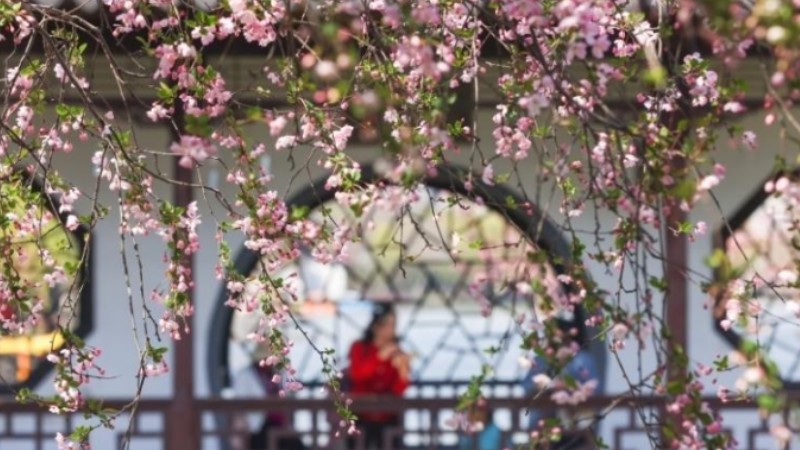US urged to explain lab accidents as its poor biosecurity records spark concerns
Throughout the past three years in fighting against the COVID-19, the international community has got bored of the US' politicization of the health crisis, with frequent attacks on China with groundless accusations.
Ironically, with numerous biology laboratories at home and abroad - some of which have been exposed as problematic - the US usually avoids talking about its own bio-lab scandals including virus leakages.
The US never offers an explanation about its own bio-lab leakages or early local COVID-19 cases, despite suspicions about bio labs such as the ones at Fort Detrick and the University of North Carolina (UNC) at Chapel Hill. Worse still, the country has hundreds of bio labs around the world, many of which have caused wide concern on their poor safety records.
"COVID-19 and other viral rampages are crises that need to be faced globally. They cannot be used as an excuse for one country to set biased standards to consolidate its hegemony," Wei Nanzhi, a research fellow with the American Institute at the Chinese Academy of Social Sciences told the Global Times. "In addressing the challenges, we need true openness and transparency and mutual respect between countries."
Mysteries unsolved
For decades, accidents have reportedly occurred at several bio labs across the US, some of which are even high-level labs, including a P-4 (protection level 4) facility at Fort Detrick run by the US military. This is particularly concerning considering the consistently radical position the country holds on biological weapons development, warned some Chinese experts.
The Ninth Review Conference of the Biological Weapons Convention (BWC) that took place at the end of 2022 in Geneva, Switzerland, decided to strengthen the effectiveness and full compliance of the BWC through ways such as formulating legally binding measures.
The efforts are valuable, particularly when individual countries still try hard to hinder the BWC from going further. For decades, the US stood alone in opposing the establishment of a verification mechanism for the BWC, which may imply its possible secret development of biological weapons, observers noted.
The US' political reality determines the development of its highly secretive military biological defense programs, said Wang Xiaoli, a research fellow at the Center of Biosecurity and Policy Study under the Institute Pasteur of Shanghai with the Chinese Academy of Sciences.
"Lacking effective external supervision, [the programs] are bound to breed more fatal risks within the country, and in effect lead to the risk of proliferation of biological weapons," Wang told the Global Times.
The US Army Medical Research Institute of Infectious Diseases (USAMRIID) at Fort Detrick, Maryland, has been at the center of global attention for years. As the US' largest research center for biochemical weapons, the institute's spotty history and its recent accidents triggered wide concern.
Decades ago, to get real biological warfare and experiment data, the institute conducted a backdoor deal with members of Unit 731, a Japanese Imperial Army unit notorious for its atrocious chemical experimentation on Chinese and Russian people during World War II, according to documents published on the website of the US National Library of Medicine.
Many mysteries surrounding USAMRIID have never been solved due to the US' hiding information. In July 2019, six months before the US reported its first COVID-19 case, the institute was temporarily shut down for reported "ongoing infrastructure issues with wastewater decontamination."
The explanation was not persuasive, as mistakes like facility failures and wastewater leakage shouldn't have happened in a P4 laboratory like USAMRIID, which has strict management and regular checks to avoid potential risks, a Beijing-based virologist who requested anonymity told the Global Times.
Over the years there has been lots of media coverage of "unknown diseases," especially lung-related, among residents near USAMRIID. The US government nonetheless turns a blind eye to the public anger, refusing to release any further information about the institute and citing "national security reasons."
Bio labs at UNC at Chapel Hill also caused suspicion in the search for COVID-19 origins, for their poor safety record and the unwillingness of the lab personnel to speak publicly.
At least 28 lab incidents involving genetically engineered organisms reportedly happened at UNC labs within five years (from January 2016 to June 2020), six of which were coronavirus-related. The university declined to answer questions or disclose key details to the public, according to ProPublica, a New York-based nonprofit news website.
The US has opposed the signing of a BWC verification protocol since the early 2000s, out of its need to emphasize its own military and pharmaceutical industry secrets, Wang told the Global Times.
"Maintaining the world's largest bio-defensive program without public scrutiny, while keeping itself outside international norms, the US has greatly increased [global] biosecurity risks," Wang warned.
Sowing hazards globally
In addition to the questionable domestic labs, the US Department of Defense controls 336 biological laboratories in 30 countries. In the areas surrounding the biological labs it has set up, there have been occasional outbreaks of unexplained regional mass infections, thought to be possibly related to these laboratories run by the US.
However, in the face of the local population's complaints, the US government has refused to open up for investigation or release details.
On April 5, 2022, civic groups and local residents went to the streets to protest against the US biological labs near its military base in Busan, South Korea, the Xinhua News Agency reported.
This is not the first time that South Koreans have expressed dissatisfaction with US laboratories. In August 2021, a South Korean civic group sued the Fort Detrick biological laboratory and the US Forces Korea (USFK) over the smuggling of toxic substances to US military bases in violation of domestic law.
Local media reports said that the US military set up several biological labs at its military bases in South Korea to conduct high-risk biochemical research since 2009.
A probe by the US Department of Defense, released in July 2015, found that a US military lab in Utah had failed to neutralize live anthrax spores and shipped the toxic samples to researchers in 86 labs in the US and seven other countries, including South Korea.
The USFK initially said it was the first time it experimented with deadly biological agents. But a joint panel investigation showed that the USFK brought in and tested dead anthrax samples 15 times at the Yongsan Garrison in central Seoul between 2009 and 2014.
Even faced with local people's mounting public indignation for the secret importation and experiments with the toxic materials, the US has not stopped the experiments.
According to South Korea's Ministry of Trade, Industry and Energy, the USFK smuggled deadly toxic substances into the US military bases in Pyeongtaek, Gunsan, Osan and Pier 8 of Busan Port in November 2017, October 2018 and January 2019.
Such crisis also occurred in Japan. In December 2021, the Okinawa Prefecture examined the water quality near the US military bases and found alarming levels of a suspected carcinogen. It also found other harmful substances at 38 locations, or more than 70 percent of 49 surveyed sites, the Asahi Shimbun reported.
"The central and prefectural governments have asked the US military to allow them to conduct on-site inspections at its bases. But those requests fell on deaf ears..." the Asahi Shimbun said.
The US has never been clear on its biosecurity commitments to the international community, and has frequently gone back on its word, Wang said.
The construction and operation of overseas biological laboratories funded by the US government satisfy the military's defensive research needs, while imposing the risk of the release or spread of homegrown high-risk pathogens on the host population, he noted.
Vague attitude
With numerous lab-related accidents and even wrongdoing over the years, the US should have actively responded to the biosecurity concerns of the global community, including the concerns about the possible connection between its lab leakages and the spread of COVID-19.
However, the US government and scientists have been taking a vague attitude toward the issue. The country has neither opened suspicious bio labs for investigation, nor disclosed information related to local tracing of COVID origins, experts commented.
Some scholars have urged the US to make public the serum samples of flu patients in the 2019 flu season, as some of the "flu patients" might actually have had COVID-19. This appeal echoed several US citizens who shared online their "flu" symptoms, which were very similar to those of COVID-19.
"There is a saying that 'science has no borders, but scientists have motherlands,' while science itself is objective," Wei told the Global Times. "But in the US, it is the intelligence community and politicians who draw conclusions on behalf of so-called science."
The murky attitude of the US government stands in stark contrast to China's openness.
China has been open and transparent, and shared information and data on COVID-19 with the international community in a timely manner, Chinese Foreign Ministry spokespersons reiterated at routine press conferences.
"It is the US who should respond to the world's questions and concerns over Fort Detrick and its military and biological labs across the world. By politicizing the issue, the US will not succeed in discrediting China. Instead, it will only hurt the US' own credibility," Foreign Ministry spokesperson Mao Ning noted at a routine press briefing on February 28.
Photos
Related Stories
- Why it is always US military plane that runs into ‘accident’
- US drone crash incident may not escalate, but risks increase with US increasing its global reconnaissance
- China slams U.S. "drama for democracy"
- Customers line up to withdraw money at SVB
- Experts: US bank collapse result of failure to adhere to core activities
- U.S. regulators close Silicon Valley Bank
- U.S. CDC lifts COVID-19 testing requirements for travelers from China
- Game of lies
- WHO expert 'frustrated' over US unwillingness to share info on COVID origins tracing
- Stuck in conundrum: US sees rising economic polarization
Copyright © 2023 People's Daily Online. All Rights Reserved.









